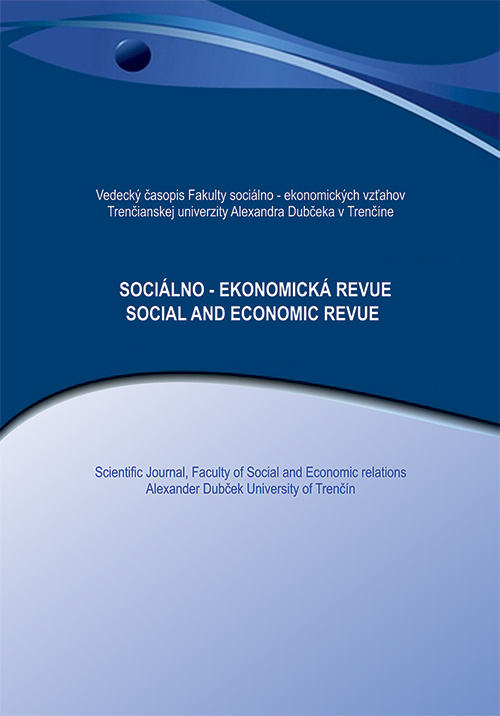INTEGRATION OF AI IN ENTERPRISES AND ITS IMPACT ON EMPLOYEE SATISFACTION, ENGAGEMENT AND TRUST IN HUMAN RESOURCE MANAGEMENT. BIBLIOMETRIC ANALYSIS
The aim of this paper is to summarize the current state, knowledge and research trends on artificial intelligence in the area of its impact on the well-being, satisfaction, trust and engagement of employees in the enterprise. Understanding these relationships between AI-based decision-making and the well-being and engagement of employees in the enterprise will be crucial in the near future in designing artificial intelligence systems that should be not only effective but also ethical. In this context, this study aims to reveal the current state and trends in published studies of publications on the integration of AI in enterprises and its impact on employee satisfaction, engagement and trust in human resource management through a bibliometric review. For this purpose, 94 publications on this topic were identified in the Web of Science (WoS) database and bibliometric analyses were performed using the software tool VOSviewer. These analyses resulted in bibliometric data such as the number of publications and citations by year, most cited authors, countries, publications, their collaborations, WoS categories, and content information regarding the topics and objectives of the studies. It was found that publications on AI in human resource management in the context of employee well-being, satisfaction, and engagement started to appear as early as 2018, but a more intense increase was only seen in 2020, and they continued to develop into a new research area. The potential gaps indicated by the findings of this study will guide future research and development in the relevant sectors.
Vydanie: 2025/1 Strany: 29-43 Klasifikácia JEL: J28, O15, O33
DOI: https://doi.org/10.52665/ser20250103
Kľúčové slová: artificial intelligence, human resource management, employee satisfaction, employee engagement, trust
Sekcia:
Kontakty:
Katarína, Kráľová, Ing., Ph.D.
Faculty of Social and Economic Relations
Alexander Dubček University in Trenčín
Študentská 3. 911 50 Trenčín
Slovak Republic
e-mail: katarina.kralova@tnuni.sk
Literatúra:
Arslan, A., Cooper, C., Khan, Z., Golgeci, I., & Ali, I. (2021). Artificial intelligence and human workers interaction at team level: A conceptual assessment of the challenges and potential HRM strategies. International Journal of Manpower, 43(1), 75–88. https://doi.org/10.1108/IJM-01-2021-0052
Bamel, U., Kumar, S., Lim, W. M., Bamel, N., & Meyer, N. (2022). Managing the dark side of digitalization in the future of work: A fuzzy TISM approach. Journal of Innovation & Knowledge, 7(4), 100275. https://doi.org/10.1016/j.jik.2022.100275
Bhatt, P. and Muduli, A. (2023), "Artificial intelligence in learning and development: a systematic literature review", European Journal of Training and Development, Vol. 47 No. 7/8, pp. 677-694. https://doi.org/10.1108/EJTD-09-2021-0143
Black, J. S., & van Esch, P. (2021). AI-enabled recruiting in the war for talent. Business Horizons, 64(4), 513–524. https://doi.org/10.1016/j.bushor.2021.02.015
Braganza, A., Chen, W., Canhoto, A., & Sap, S. (2021). Productive employment and decent work: The impact of AI adoption on psychological contracts, job engagement and employee trust. Journal of Business Research, 131, 485–494. https://doi.org/10.1016/j.jbusres.2020.08.018
Do, H., Chu, L. X., & Shipton, H. (2025). How and when AI-driven HRM promotes employee resilience and adaptive performance: A self-determination theory. Journal of Business Research, 192, 115279. https://doi.org/10.1016/j.jbusres.2025.115279
Donthu, N., Kumar, S., Mukherjee, D., Pandey, N., & Lim, W. M. (2021). How to conduct a bibliometric analysis: An overview and guidelines. Journal of Business Research, 133, 285–296. https://doi.org/10.1016/j.jbusres.2021.04.070
Ercan, F., Sayın, K., Dalgın, T., & Gençer, K. (2025). A Bibliometric and Systematic Review of Publications on Augmented Reality in Sustainable Tourism. Sustainability, 17(4), Article 4. https://doi.org/10.3390/su17041508
Fan, D., Breslin, D., Iszatt-White, M., & Callahan, J. (2022). Advancing Literature Review Methodology through Rigour, Generativity, Scope and Transparency. International Journal of Management Reviews, 24. https://doi.org/10.1111/ijmr.12291
Fritts, M., & Cabrera, F. (2021). AI recruitment algorithms and the dehumanization problem. Ethics and Information Technology, 23(4), 791–801. https://doi.org/10.1007/s10676-021-09615-w
Haddaway, N. R., Page, M. J., Pritchard, C. C., & McGuinness, L. A. (2022). PRISMA2020: An R package and Shiny app for producing PRISMA 2020-compliant flow diagrams, with interactivity for optimised digital transparency and Open Synthesis. Campbell Systematic Reviews, 18(2), e1230. https://doi.org/10.1002/cl2.1230
Chen, N., Zhao, X., & Wang, L. (2024). The Effect of Job Skill Demands Under Artificial Intelligence Embeddedness on Employees’ Job Performance: A Moderated Double-Edged Sword Model. Behavioral Sciences, 14(10), 974. https://doi.org/10.3390/bs14100974
Chowdhury, S., Dey, P., Joel-Edgar, S., Bhattacharya, S., Rodriguez-Espindola, O., Abadie, A., & Truong, L. (2023). Unlocking the value of artificial intelligence in human resource management through AI capability framework. Human Resource Management Review, 33(1), 100899. https://doi.org/10.1016/j.hrmr.2022.100899
Jiang, Y., Li, X., Luo, H., Yin, S., & Kaynak, O. (2022). Quo vadis artificial intelligence? Discover Artificial Intelligence, 2(1), 4. https://doi.org/10.1007/s44163-022-00022-8
Kearney, C., & Meynhardt, T. (2016). Directing Corporate Entrepreneurship Strategy in the Public Sector to Public Value: Antecedents, Components, and Outcomes. International Public Management Journal, 19(4), 543–572. https://doi.org/10.1080/10967494.2016.1160013
Kong, H., Yuan, Y., Baruch, Y., Bu, N., Jiang, X., & Wang, K. (2021). Influences of artificial intelligence (AI) awareness on career competency and job burnout. International Journal of Contemporary Hospitality Management, 33(2), 717–734. https://doi.org/10.1108/IJCHM-07-2020-0789
Li, J., Wu, T.-J., Wu, Y., & Goh, M. (2023). Systematic literature review of human-machine collaboration in organizations using bibliometric analysis. Management Decision, 61, 2920–2944. https://doi.org/10.1108/MD-09-2022-1183
Liang, X., Guo, G., Shu, L., Gong, Q., & Luo, P. (2022). Investigating the double-edged sword effect of AI awareness on employee’s service innovative behavior. Tourism Management, 92, 104564. https://doi.org/10.1016/j.tourman.2022.104564
Liu, X., & Li, Y. (2025a). Examining the Double-Edged Sword Effect of AI Usage on Work Engagement: The Moderating Role of Core Task Characteristics Substitution. Behavioral Sciences, 15(2), 206. https://doi.org/10.3390/bs15020206
Liu, X., & Li, Y. (2025b). Examining the Double-Edged Sword Effect of AI Usage on Work Engagement: The Moderating Role of Core Task Characteristics Substitution. Behavioral Sciences, 15(2), 206. https://doi.org/10.3390/bs15020206
Malik, A., Budhwar, P., Patel, C., & Srikanth, N. R. (2022). May the bots be with you! Delivering HR cost-effectiveness and individualised employee experiences in an MNE. The International Journal of Human Resource Management, 33(6), 1148–1178. https://doi.org/10.1080/09585192.2020.1859582
McCarthy, J. (1956). Measures of the value of information. Proceedings of the National Academy of Sciences, 42(9), 654–655. https://doi.org/10.1073/pnas.42.9.654
Milojević, S. (2020). Practical method to reclassify Web of Science articles into unique subject categories and broad disciplines. Quantitative Science Studies, 1(1), 183–206. https://doi.org/10.1162/qss_a_00014
Mutlu Avinç, G., & Yıldız, A. (2025). A bibliometric and systematic review of scientific publications on metaverse research in architecture: Web of science (WoS). International Journal of Technology and Design Education, 35(2), 825–849. https://doi.org/10.1007/s10798-024-09918-1
Nankervis, A., Connell, J., Cameron, R., Montague, A., & Prikshat, V. (2021). ‘Are we there yet?’ Australian HR professionals and the Fourth Industrial Revolution. Asia Pacific Journal of Human Resources, 59(1), 3–19. https://doi.org/10.1111/1744-7941.12245
Pei, X., Guo, J., & Wu, T.-J. (2025). How Ambivalence Toward Digital–AI Transformation Affects Taking-Charge Behavior: A Threat–Rigidity Theoretical Perspective. Behavioral Sciences, 15(3), 261. https://doi.org/10.3390/bs15030261
Sweiss, M., & Yamin, M. (2024). The Role of AI-Enabled Human Resource Practices Towards Task Satisfaction and Employee Creative Willingness. SAGE Open, 14. https://doi.org/10.1177/21582440241281618
Tambe, P., Cappelli, P., & Yakubovich, V. (2019). Artificial Intelligence in Human Resources Management: Challenges and a Path Forward. California Management Review, 61(4), 15–42. https://doi.org/10.1177/0008125619867910
Team, B. E. (2019, november 7). Artificial Intelligence in HR Management—What Can We Expect? BOSS Magazine. https://thebossmagazine.com/ai-hr-management/
Wang, S., Lim, W. M., Cheah, J.-H., & Lim, X.-J. (2025). Working with robots: Trends and future directions. Technological Forecasting and Social Change, 212, 123648. https://doi.org/10.1016/j.techfore.2024.123648
Xie, H., Zhang, Y., Wu, Z., & Lv, T. (2020). A Bibliometric Analysis on Land Degradation: Current Status, Development, and Future Directions. Land, 9(1), 28. https://doi.org/10.3390/land9010028
Yan, L., & Zhiping, W. (2023). Mapping the Literature on Academic Publishing: A Bibliometric Analysis on WOS. SAGE Open, 13(1), 21582440231158562. https://doi.org/10.1177/21582440231158562
Zhang, Q., Liao, G., Ran, X., & Wang, F. (2025). The Impact of AI Usage on Innovation Behavior at Work: The Moderating Role of Openness and Job Complexity. Behavioral Sciences, 15(4), 491. https://doi.org/10.3390/bs15040491
Zhao, J., Hu, E., Han, M., Jiang, K., & Shan, H. (2023). That honey, my arsenic: The influence of advanced technologies on service employees’ organizational deviance. Journal of Retailing and Consumer Services, 75, 103490. https://doi.org/10.1016/j.jretconser.2023.103490
Zheng, J., & Zhang, T. (2025). Association Between AI Awareness and Emotional Exhaustion: The Serial Mediation of Job Insecurity and Work Interference with Family. Behavioral Sciences, 15(4), 401. https://doi.org/10.3390/bs15040401


